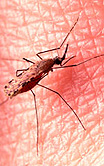
THURSDAY, July 15 (HealthDay News) — In what might someday be a major advance against one of the world’s most devastating diseases, researchers say they’ve created a mosquito that is unable to infect humans with malaria.
The University of Arizona team reported that their genetically altered mosquitoes are immune to the malaria-causing parasite, a single-cell organism called Plasmodium. The mosquitoes used in the research were Anopheles stephensi, a species that plays a major role in malaria transmission throughout the Indian subcontinent.
It may be possible someday to replace wild mosquitoes with lab-bred mosquitoes that can’t infect humans with malaria, researchers said.
“If you want to effectively stop the spreading of the malaria parasite, you need mosquitoes that are no less than 100 percent resistant to it. If a single parasite slips through and infects a human, the whole approach will be doomed to fail,” research leader and entomology professor Michael Riehle said in a university news release.
He and his colleagues tested their genetically-altered mosquitoes by feeding them malaria-infested blood. Not a single mosquito became infected with the malaria parasite.
“We were surprised at how well this works. We were just hoping to see some effect on the mosquitoes’ growth rate, lifespan or their susceptibility to the parasite, but it was great to see that our construct blocked the infection process completely,” Riehle said.
Each year, about 250 million people worldwide contract malaria and about one million die, most of them children.
The study appears July 15 in the journal PLoS Pathogens.
More information
The World Health Organization has more about malaria.

